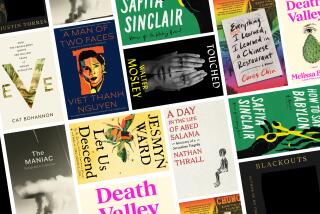In ‘Prodigy,’ Marie Lu burnishes her ‘Legend’ series
Prodigy
A Legend Novel
By Marie Lu
G.P. Putnam’s Sons: 384 pp., $17.99, ages 12 and older
The second book in any trilogy typically ends up the underachieving middle child: Instead of introducing us to a world or providing the series’ climax, it’s just connective tissue. This is especially true in the YA world, even in a blockbuster series — think “Crossed” (the “Matched” series), “Catching Fire” (“The Hunger Games”) and “New Moon” (“Twilight”).
Marie Lu has beaten the curse with “Prodigy,” the second book in the “Legend” series.
A video-game art designer based in Pasadena, Lu is masterful at creating atmospheric, urban futurescapes in which an elite, skyscraper-dwelling minority holds down impoverished masses with military might. Given her cinematic flair, it’s not a surprise that the series’ first book, also called “Legend,” is slated to become a film.
Her vision of a dystopian Los Angeles — which resembles Silver Lake transformed into what seems like oceanfront property by global warming — made it feel chillingly real, like any city dweller’s worst nightmare. It has all the chivalry of “Robin Hood” and all the shine and grime of “Blade Runner.” While most of “The Hunger Games” takes place in a pseudo-pastoral setting, this series is decidedly set in an urban jungle.
“Legend” was a two-character collision: High-rise dweller June — a calculating, beautiful military prodigy who lost both of her parents while young — went hunting after Day, a good-natured street kid who happened to be the sinister government’s most wanted criminal. Day served as a hero for the downtrodden masses in the slums, a filthy Hobbesian netherworld in which life is so nasty and brutish that a short life span can be seen as a blessing.
June was determined to eliminate Day, whom she presumed to be her brother’s murderer — until, that is, she met him, a rough-hewn lady-killer with part-Mongolian good looks and striking long white-blond hair.
As “Prodigy” opens, former foes Day and June, after creating a complicated alliance shot through with uneasy passion in the first book, are on the run together.
June’s analytic side makes romance a challenge, even when they get the chance to get hot and heavy and Day confesses his feelings. Sounding like a teen girl version of Mr. Spock, June thinks: “My heart flips in excitement at the desire in his voice — but, at the same time, the technical part of my brain instantly flares up. Highly improbable, it scoffs.”
They travel from a bizarre future Vegas, now a military capital that brings together combat maneuvers with the city’s more familiar nocturnal delights, to the war front in snowy Colorado.
The two become entangled with ruthless rebel group the Patriots, who force June to go undercover, moving back into the chic penthouse power center of the Republic. There, she gets involved with Anden, the handsome head of the Republic that June has been assigned to help assassinate for the Patriots’ slippery leader, Razor.
The setup provides the story with a taut love triangle. Although the trope is familiar — the tough, underclass survivor battling a pampered aristocrat for the love of a young woman caught in the middle — Lu’s sharp dissection of the class dynamics make it more precarious for the characters and more interesting for us. The well-drawn worlds, political undercurrents and the believability of the characters make it all feel fresh.
Unlike “The Hunger Games,” which delivers its adrenaline rush by giving kids bows and arrows, this series’ power is derived through its layered atmospheres and the way its characters reflect and fight their worlds — and one another.
With “Prodigy,” Lu proves that a Book 2 needn’t play second fiddle, providing intrigue and deep pleasure all its own.
More to Read
Sign up for our Book Club newsletter
Get the latest news, events and more from the Los Angeles Times Book Club, and help us get L.A. reading and talking.
You may occasionally receive promotional content from the Los Angeles Times.






